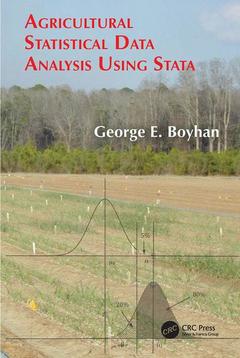Description
Agricultural Statistical Data Analysis Using Stata
Author: Boyhan George
Language: English
Subjects for Agricultural Statistical Data Analysis Using Stata:
Keywords
RCBD; CRD; statistical analyses; Dialog Box; analysis of variance; ZYMV; descriptive statistics; Command Window; regression and correlation; Windows Computer; programming; ANOVA Table; Data Editor; Main Window; Duncan’s Multiple Range Test; Data Editor Window; Unix Computer; Oneway Command; Graph Editor; Graph Window; Experimental Units; SPLIT PLOT DESIGN; Summarize Command; Results Window; Master Dataset; V3 V3; V1 V3; Graph Editor Window; V3 V3 V2; Li Ne
Publication date: 06-2017
· 15.6x23.4 cm · Hardback
Publication date: 06-2013
264 p. · 15.6x23.4 cm · Paperback
Description
/li>Contents
/li>Biography
/li>
Practical statistics is a powerful tool used frequently by agricultural researchers and graduate students involved in investigating experimental design and analysis. One of the most widely used statistical analysis software packages for this purpose is Stata. The Stata software program has matured into a user-friendly environment with a wide variety of statistical functions. Agricultural Statistical Data Analysis Using Stata introduces readers to the use of Stata to solve agricultural statistical problems.
The book begins with an overview of statistical software and the Stata program. It explains the various windows and menus and describes how they are integrated. The next chapters explore data entry and importing as well as basic output formats and descriptive statistics. The author describes the ever-increasing design complexity and how this is implemented in the software. He reviews one of Stata?s strongest features, which is its programming ability. He also examines post hoc tests as well as Stata?s graphing capabilities. The final chapters provide information on regression analysis, data transformations, and the analyses of non-parametric data.
Many agricultural researchers are unprepared for the statistics they will need to use in their profession. Written in an easy-to-read format with screen shots and illustrations, the book is suitable for a wide audience, including beginners in statistics who are new to Stata, as well as more advanced Stata users and those interested in more complex designs.
These books may interest you

A Gentle Introduction to Stata 128.92 €



